新人教版九年级 Unit8 It must belong to Carla.
- 格式:doc
- 大小:78.50 KB
- 文档页数:36
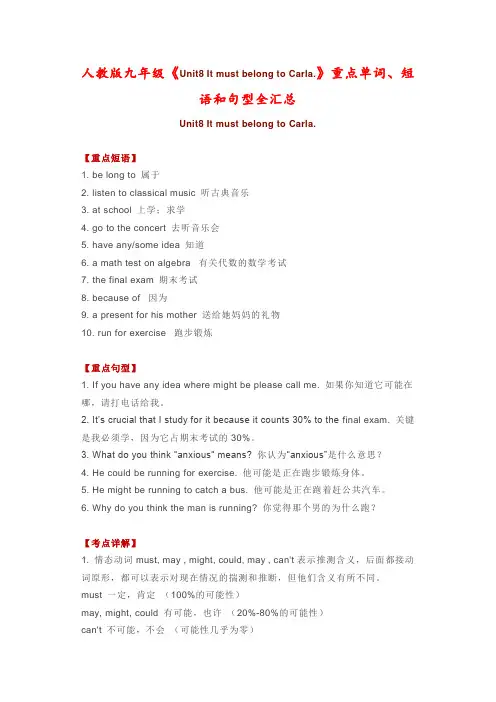
人教版九年级《Unit8 It must belong to Carla.》重点单词、短语和句型全汇总Unit8 It must belong to Carla.【重点短语】1. be long to 属于2. listen to classical music 听古典音乐3. at school 上学;求学4. go to the concert 去听音乐会5. have any/some idea 知道6. a math test on algebra 有关代数的数学考试7. the final exam 期末考试8. because of 因为9. a present for his mother 送给她妈妈的礼物10. run for exercise 跑步锻炼【重点句型】1. If you have any idea where might be please call me. 如果你知道它可能在哪,请打电话给我。
2. It’s crucial that I study for it because it counts 30% to the final exam. 关键是我必须学,因为它占期末考试的30%。
3. What do you think “anxious“ means? 你认为“anxious”是什么意思?4. He could be running for exercise. 他可能是正在跑步锻炼身体。
5. He might be running to catch a bus. 他可能是正在跑着赶公共汽车。
6. Why do you think the man is running? 你觉得那个男的为什么跑?【考点详解】1. 情态动词must, may , might, could, may , can't表示推测含义,后面都接动词原形,都可以表示对现在情况的揣测和推断,但他们含义有所不同。
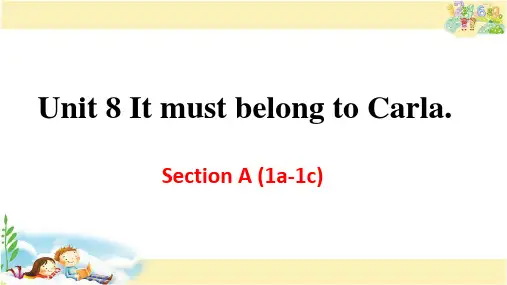
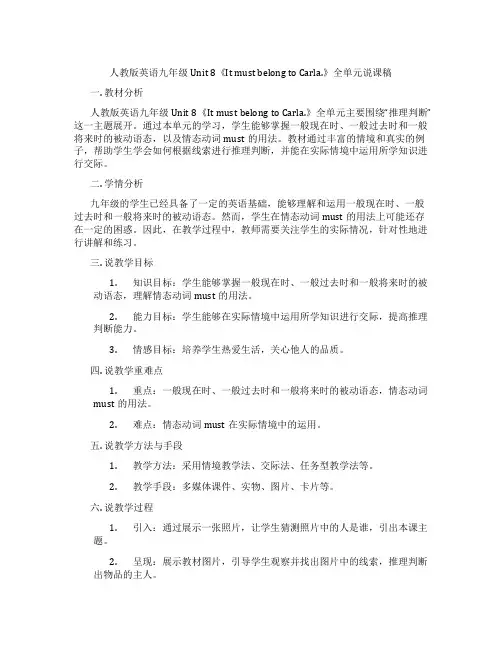
人教版英语九年级Unit 8《It must belong to Carla.》全单元说课稿一. 教材分析人教版英语九年级Unit 8《It must belong to Carla.》全单元主要围绕“推理判断”这一主题展开。
通过本单元的学习,学生能够掌握一般现在时、一般过去时和一般将来时的被动语态,以及情态动词must的用法。
教材通过丰富的情境和真实的例子,帮助学生学会如何根据线索进行推理判断,并能在实际情境中运用所学知识进行交际。
二. 学情分析九年级的学生已经具备了一定的英语基础,能够理解和运用一般现在时、一般过去时和一般将来时的被动语态。
然而,学生在情态动词must的用法上可能还存在一定的困惑。
因此,在教学过程中,教师需要关注学生的实际情况,针对性地进行讲解和练习。
三. 说教学目标1.知识目标:学生能够掌握一般现在时、一般过去时和一般将来时的被动语态,理解情态动词must的用法。
2.能力目标:学生能够在实际情境中运用所学知识进行交际,提高推理判断能力。
3.情感目标:培养学生热爱生活,关心他人的品质。
四. 说教学重难点1.重点:一般现在时、一般过去时和一般将来时的被动语态,情态动词must的用法。
2.难点:情态动词must在实际情境中的运用。
五. 说教学方法与手段1.教学方法:采用情境教学法、交际法、任务型教学法等。
2.教学手段:多媒体课件、实物、图片、卡片等。
六. 说教学过程1.引入:通过展示一张照片,让学生猜测照片中的人是谁,引出本课主题。
2.呈现:展示教材图片,引导学生观察并找出图片中的线索,推理判断出物品的主人。
3.讲解:讲解一般现在时、一般过去时和一般将来时的被动语态,情态动词must的用法。
4.练习:学生分组进行角色扮演,运用所学知识进行交际。
5.巩固:学生完成教材练习题,检测所学知识。
6.拓展:引导学生运用所学知识,谈论现实生活中的人和事。
七. 说板书设计板书设计需突出本课重点内容,包括一般现在时、一般过去时和一般将来时的被动语态,以及情态动词must的用法。
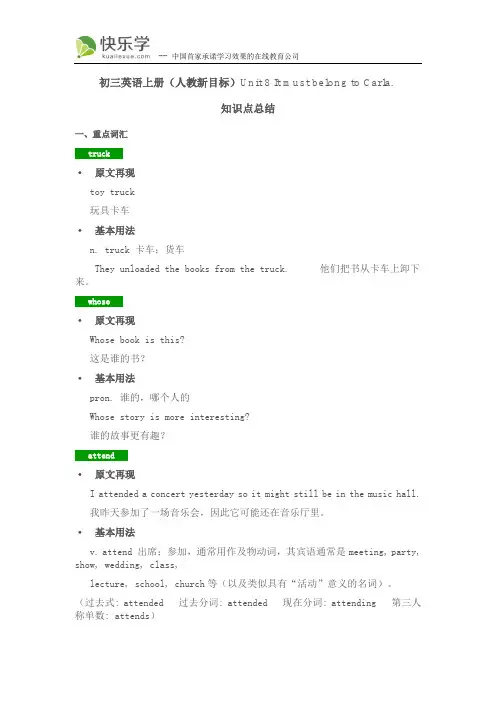
初三英语上册(人教新目标)Unit 8 It must belong to Carla.知识点总结一、重点词汇truck·原文再现toy truck玩具卡车·基本用法n. truck 卡车;货车They unloaded the books from the truck. 他们把书从卡车上卸下来。
whose·原文再现Whose book is this?这是谁的书?·基本用法pron. 谁的,哪个人的Whose story is more interesting?谁的故事更有趣?attend·原文再现I attended a concert yesterday so it might still be in the music hall.我昨天参加了一场音乐会,因此它可能还在音乐厅里。
·基本用法v. attend 出席;参加,通常用作及物动词,其宾语通常是meeting, party, show, wedding, class,lecture, school, church等(以及类似具有“活动”意义的名词)。
(过去式: attended 过去分词: attended 现在分词: attending 第三人称单数: attends)Did you attend the meeting yesterday?你昨天去开会了吗?He was ill and didn’t attend sc hool.他有病,没有去上学。
·知识拓展相关短语attend to 注意;专心于;照料。
如:If you don’t attend to your teacher, you will never learn anything.你要是不注意听老师讲,你就会什么也学不到。
If you go out, who will attend to the baby?你要是出去,谁来照顾婴儿?词义辨析:attend/join/join in/take part in这些动词或词组均含“参加,加入”之意。
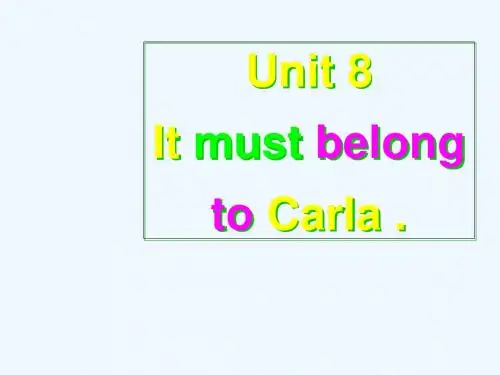
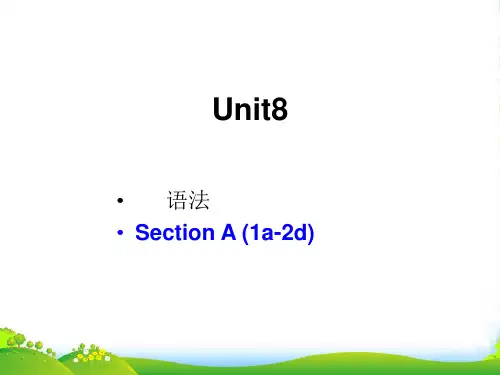
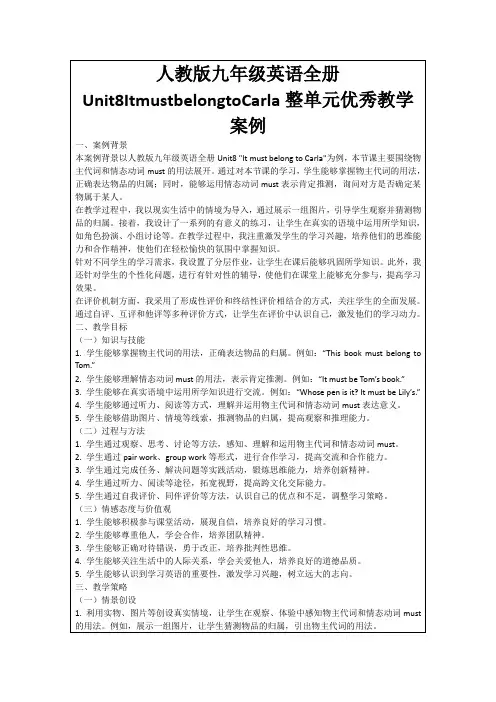
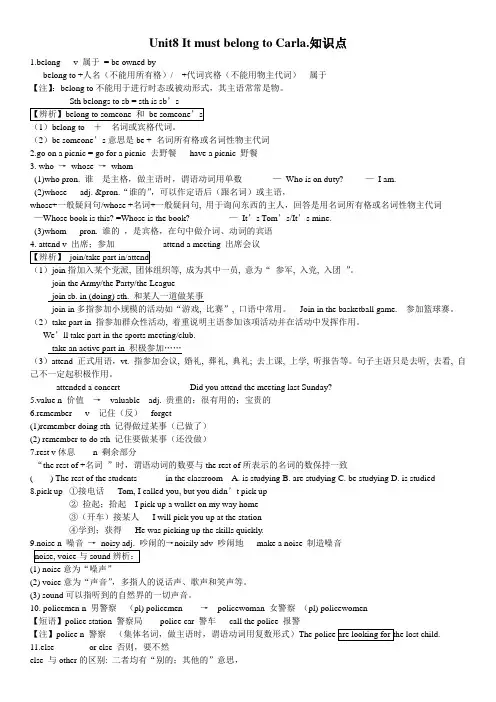
Unit8 It must belong to Carla.知识点1.belong v 属于= be owned bybelong to +人名(不能用所有格)/ +代词宾格(不能用物主代词)属于【注】:belong to不能用于进行时态或被动形式,其主语常常是物。
(1)belong to+名词或宾格代词。
(2)be someone’s意思是be + 名词所有格或名词性物主代词2.go on a picnic = go for a picnic 去野餐have a picnic 野餐3. who →whose →whom(1)who pron. 谁是主格,做主语时,谓语动词用单数—Who is on duty? —I am.(2)whose adj. &pron.“谁的”,可以作定语后(跟名词)或主语,whose+一般疑问句/whose +名词+一般疑问句, 用于询问东西的主人,回答是用名词所有格或名词性物主代词—Whose book is this? =Whose is the book? —It’s Tom’s/It’s mine.(3)whom pron. 谁的,是宾格,在句中做介词、动词的宾语attend a meeting 出席会议(1)join指加入某个党派, 团体组织等, 成为其中一员, 意为“参军, 入党, 入团”。
join the Army/the Party/the Leaguejoin sb. in (doing) sth. 和某人一道做某事join in多指参加小规模的活动如“游戏, 比赛”, 口语中常用。
Join in the basketball game. 参加篮球赛。
(2)take part in 指参加群众性活动, 着重说明主语参加该项活动并在活动中发挥作用。
We’ll take part in the sports meeting/club.take an active part in 积极参加……(3)attend 正式用语,vt. 指参加会议, 婚礼, 葬礼, 典礼; 去上课, 上学, 听报告等。
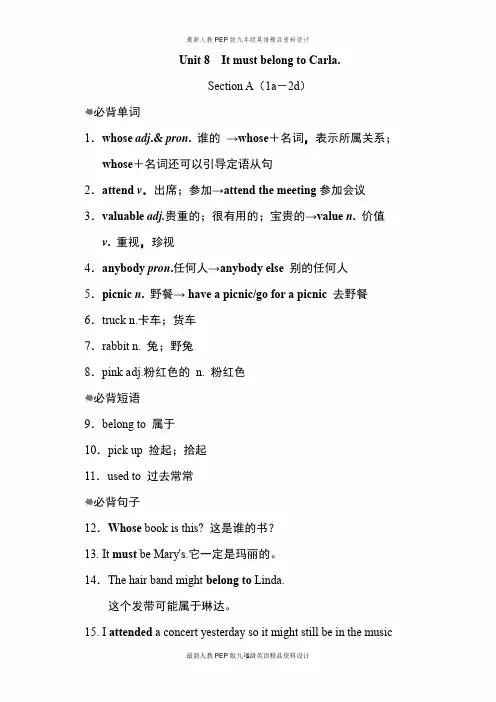
Unit 8 It must belong to Carla.Section A(1a-2d)必背单词1.whose adj.& pron. 谁的→whose+名词,表示所属关系;whose+名词还可以引导定语从句2.attend v.出席;参加→attend the meeting参加会议3.valuable adj.贵重的;很有用的;宝贵的→value n. 价值v. 重视,珍视4.anybody pron.任何人→anybody else 别的任何人5.picnic n. 野餐→ have a picnic/go for a picnic 去野餐6.truck n.卡车;货车7.rabbit n. 兔;野兔8.pink adj.粉红色的n. 粉红色必背短语9.belong to 属于10.pick up 捡起;拾起11.used to 过去常常必背句子12.Whose book is this? 这是谁的书?13. It must be Mary's.它一定是玛丽的。
14.The hair band might belong to Linda.这个发带可能属于琳达。
15. I attended a concert yesterday so it might still be in the musichall. 昨天我参加了一个音乐会,所以它可能还在音乐厅。
16.Do you have anything valuable in your schoolbag?在你的书包里有什么贵重物品吗?Section A(3a~4c)必背单词1.noise n.声音;噪音→noisy adj.吵闹的→make noise 制造噪音2.policeman n.男警察→ policemen(pl.)3.wolf n.狼→wolves(pl.)4.sleepy adj.困倦的;瞌睡的→feel sleepy 感到困倦;→asleep adj.睡着的→fall asleep入睡→ be asleep睡着→sleeping adj.熟睡的→ a sleeping baby一个熟睡的婴儿5.laboratory n.实验室6.coat n.外套;外衣必背短语7.nothing much 没什么事8.at first 起初9.in the neighborhood 在街区里10.go away 离开必背句子11. Something unusual is happening in our town.不寻常的事正发生在我们镇上。
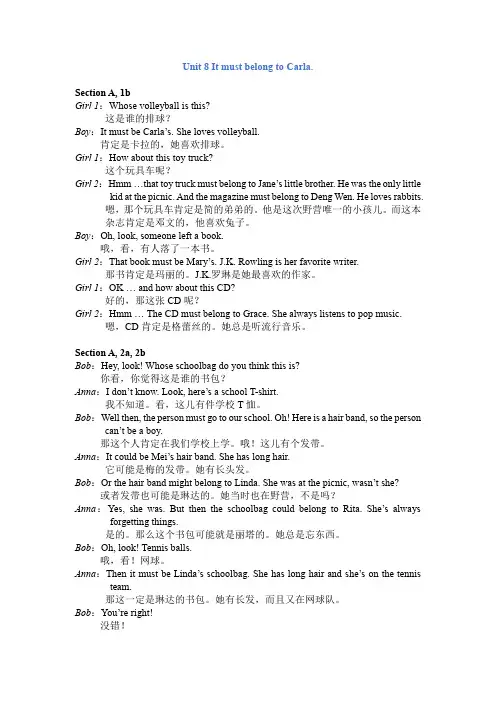
Unit 8 It must belong to Carla.Section A, 1bGirl 1:Whose volleyball is this?这是谁的排球?Boy:It must be Carla’s. She loves volleyball.肯定是卡拉的,她喜欢排球。
Girl 1:How about this toy truck?这个玩具车呢?Girl 2:Hmm …that toy truck must belong to Jane’s little brother. He was the only little kid at the picnic. And the magazine must belong to Deng Wen. He loves rabbits.嗯,那个玩具车肯定是简的弟弟的。
他是这次野营唯一的小孩儿。
而这本杂志肯定是邓文的,他喜欢兔子。
Boy:Oh, look, someone left a book.哦,看,有人落了一本书。
Girl 2:That book must be Mary’s. J.K. Rowling is her favorite writer.那书肯定是玛丽的。
J.K.罗琳是她最喜欢的作家。
Girl 1:OK … and how about this CD?好的,那这张CD呢?Girl 2:Hmm … The CD must belong to Grace. She always listens to pop music.嗯,CD肯定是格蕾丝的。
她总是听流行音乐。
Section A, 2a, 2bBob:Hey, look! Whose schoolbag do you think this is?你看,你觉得这是谁的书包?Anna:I don’t know. Look, here’s a school T-shirt.我不知道。
看,这儿有件学校T恤。
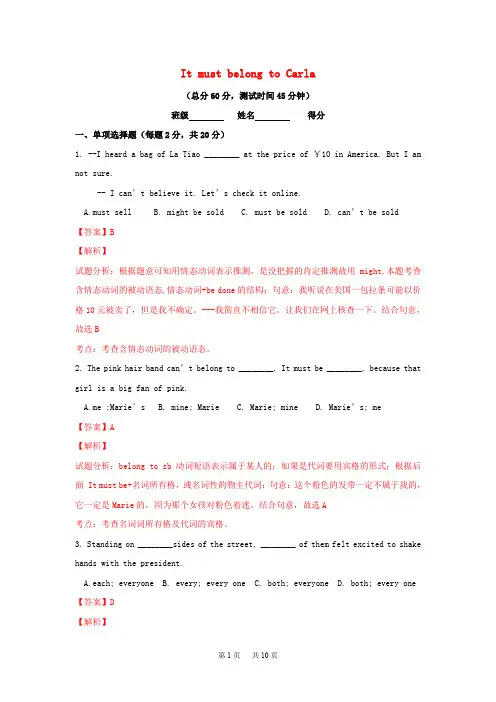
It must belong to Carla(总分60分,测试时间45分钟)班级姓名得分一、单项选择题(每题2分,共20分)1. --I heard a bag of La Tiao ________ at the price of ¥10 in America. But I am not sure.-- I can’t believe it. Let’s check it online.A.must sellB. might be soldC. must be soldD. can’t be sold【答案】B【解析】试题分析:根据题意可知用情态动词表示推测,是没把握的肯定推测故用might,本题考查含情态动词的被动语态,情态动词+be done的结构;句意:我听说在美国一包拉条可能以价格10元被卖了,但是我不确定。
---我简直不相信它。
让我们在网上核查一下。
结合句意,故选B考点:考查含情态动词的被动语态。
2. The pink hair band can’t belong to ________. I t must be ________, because that girl is a big fan of pink.A.me ;Marie’sB. mine; MarieC. Marie; mineD. Marie’s; me【答案】A【解析】试题分析:belong to sb动词短语表示属于某人的;如果是代词要用宾格的形式;根据后面 It must be+名词所有格,或名词性的物主代词;句意:这个粉色的发带一定不属于我的,它一定是Marie的,因为那个女孩对粉色着迷。
结合句意,故选A考点:考查名词词所有格及代词的宾格。
3. Standing on ________sides of the street, ________ of them felt excited to shake hands with the president.A.each; everyoneB. every; every oneC. both; everyoneD. both; every one 【答案】D【解析】试题分析:由于街道只有两边故用both;each表示两个或两个以上的每一个,后加名词的单数;every表示三者或三者以上的每一个,后加名词的单数;everyone表示每一个人不能和of短语连用;every one of....表示……中的每一人;句意:站在街道的两边,和总理握手他们当中的每个人都感到激动。
Unit8 It must belong to Carla.课文知识点最新详解Section A1. It must belong to Carla.它肯定属于卡拉。
(标题)【解析】belong v 属于= be owned bybelong to +人名(不能用所有格)+代词宾格(不能用物主代词)属于【注】:belong to不能用于进行时态或被动形式,其主语常常是物。
Sth belongs to sb = sth is sb’sThe yellow car belongs to Mr. Smith = The yellow car is Mr. Smith’s.①The sweater belongs to __________ .( Tom)②The T-shirt belongs to___________(she).③Tai Wang __________(属于) China.( ) ④The new car is owned by his father.A .belong to B. belongs to C. is like( ) ⑤Which club do you belong______?A. to B .for C .in D. at【辨析】belong to someone 和be someone’s【相同点】belong to someone 和be someone’s 含义基本相同,都表示“属于某人,归某人所有”,【不同点】用法上的区别:(1)belong to+名词或宾格代词。
(2)be someone’s意思是be + 名词所有格或名词性物主代词The English book must belong to Tom.The English must be Tom’s ( English book).2. He was the only little kid at the picnic.他是野餐中唯一的小孩。
九年级Unit 8 It must belong to Carla.Section B听力对话课文基础填空本试题源于课本,取于课本,注重双基,从字词句出发,达到掌握课本基础知识的目的。
本题运用由浅入深重复练习的方式,熟能生巧,达到回归课本掌握知识的效果。
对于好学生,这个试题可以查漏补缺,对于需要提高分数的同学,是脚踏实地的让愿望实现的途径,老师可以直接使用,排版有利于打印测试,单页单章页码调整到位,方便助力老师的教学。
本题全部取材于课本,方便家长辅导学生的学习。
本题将课本上所有的听力文本,对话,长短课文,均以提高巩固的目的进行了不同类型的试题编排,是学习的好帮手。
九年级-U8-SECTION B 听力1c, 1d---听1轮,填单词:Hey, look at the man ________ down the street. I wonder what's ________? He ________ be running for exercise. But he's ________ a ________. He ________ be late for work. He looks ________ of afraid. (pause) Oh,no! What's that? Where? ________ something in the sky. It ________ be a plane. No, it ________ be a plane. It's too big. It ________ be a UFO.A UFO? What's ________ on?n: Look, now the UFO is ________ ...And there's something strange ________ out. It must be an ________. And the alien is running ________ the man! I must be ________. Maybe we should call the ________. (pause) Hey, wait a ________. What’s that?Where? Over there. It's a woman ________ a camera.She could be from the TV news. No, look at________ those other people. They're ________. Oh! They must be ________ a movie九年级-U8-SECTION B 听力1c, 1d---听2轮,填词组:Hey, look at the man ___________ the street. I wonder ___________. He could be____________. But he's ___________. He might ___________. He___________ afraid. (pause) Oh,no! What's that? Where? ___________ in the sky.It could be a plane. No, it can't be a plane. It's too big. It _______ a UFO. A UFO? What's___________?Look, now the UFO___________ ...And there's something strange ___________. It________ an alien. And the alien is___________ the man! I ___________. Maybe we should ___________. (pause) Hey, ___________. What’s that? Where? Over there. It's a woman ___________. She ___________ the TV news. No,________ all those other people.They're actors. Oh! They___________ a movie.九年级-U8-SECTION B-2b 阅读文章1---首字母填空Stonehenge — Can Anyone E___________ Why It Is There?Stonehenge, a rock c___________, is not only one of B___________ most famoush___________places, but also one of its g___________ m___________. Every year itr___________ more than 850,000 v___________. E___________ in June, people go to this place as they want to see the sun r___________ on the longest day of the year. For many years, h___________ believed Stonehenge was a t___________ where a___________l___________ tried to c___________ with the gods. However, historian Paul Stoker thinks this can’t be t___________ because Stonehenge was b___________ so many c___________ ago. “The l___________ arrived in England much l___________,” he p___________ out. Another popular i___________ is that Stonehenge might be a kind of c___________. The large stones were put together in a c___________ way. On m___________ morning, the sun s___________ d___________ into the c___________ of the stones. Other people believe the stones have a m___________ p___________. They think the stones can p___________i___________ and k___________ people h___________. “As you walk there, you can feel the e___________ from your feet c___________ up your body,” said one v___________. No one is sure what Stonehenge was u___________ for, but most a___________ that thep___________ of the stones must be for a s___________ p___________.Some think it might be a b___________ place, or a place to h___________ a___________. Others think it was built to c___________ a v___________ over an e___________. Stonehenge was built s___________ over a long p___________ of time. Mosth___________ believe it must be almost 5,000 years old. One of the greatest m___________ is how it was built because the stones are so big and heavy. In 2001, a g___________ of English v___________ tried to build another Stonehenge, but they couldn’t. “We don’t really know who built Stonehenge,” says Paul Stoker. “And perhaps we might never know, but we do know they must have been h___________ — and great p___________!”九年级-U8-SECTION B-2b 阅读文章2---填单词Stonehenge — Can Anyone Explain Why It Is There? Stonehenge, a rock ___________圈, is not only one of ___________英国的most famous ___________历史的places, but also one of its greatest ___________奇迹. Every year it___________接纳more than 850,000 ___________参观者. ___________尤其in June, people go to this place as they want to see the sun ___________升起on the longest day of the year. For many years, ___________历史学家们believed Stonehenge was a___________寺庙where ___________古代的leaders tried to ___________交流with the gods. However, historian Paul Stoker thinks this can’t be true because Stonehenge was built so many ___________世纪ago. “The___________领导者们arrived in England much later,” he points out. Another popular idea is that Stonehenge might be a kind of___________日历. The large stones were put together in a ___________特定的way. On ___________仲夏的morning, the sun ___________照耀___________直接地into the center of the stones. Other people believe the stones have a ___________医疗的purpose. They think the stones can ___________阻止illness and keep people healthy. “As you walk there, you can feel the ___________能量from your feet climb up your body,” said one visitor. No one is sure what Stonehenge was used for, but most agree that the ___________位置of the stones must be for a special ___________目的.Some think it might be a ___________埋葬的place, or a place to ___________怀念___________祖先们. Others think it was built to celebrate a ___________胜利over an___________敌人. Stonehenge was built slowly over a long ___________阶段of time. Most historians believe it must be almost 5,000 years old. One of the greatest ___________奇迹is how it was built because the stones are so big and heavy. In 2001, a ___________队of English volunteers tried to build another Stonehenge, but they couldn’t. “We don’t really know who built Stonehenge,” says Paul Stoker. “And perhaps we might never kno w, but we do know they must have been hardworking — and great ___________计划者们,规划师!”九年级-U8-SECTION B-2b 阅读文章3---单词适形填空Stonehenge — Can Anyone Explain Why It Is There? Stonehenge, a rock circle, is not only one of Britain’s most famous ___________(history) places, but also one of its ___________(great) ___________(mystery). Every year it___________(receive) more than 850,000 visitors. ___________(special) in June, people go to this place as they want to see the sun ___________(rise) on the ___________(long) day of the year.For many years, ___________(history) believed Stonehenge was a temple where ancient leaders ___________(try) to communicate with the gods. However, historian Paul Stoker thinks this can’t be true because Stonehenge was ___________(build) so many___________(century) ago. “The leaders arrived in England much ___________(late),” he points out. Another popular idea is that Stonehenge might be a kind of calendar. The large stones were ___________(put) together in a certain way. On midsummer’s morning, the sun shines ___________(direct) into the center of the stones. Other people believe the stones have a ___________(medicine) purpose. They think the stones can prevent ___________(ill) and keep people ___________(health). “As you walk there, you can feel the energy from your feet ___________(climb) up your body,” said one ___________(visit). No one is sure what Stonehenge was used for, but most agree that the position of the stones must be for a special purpose. Some think it might be a ___________(bury) place, or a place to honor ancestors. Others think it was built to celebrate a victory over an enemy.Stonehenge was built ___________(slow) over a long period of time. Most historians believe it must be almost 5,000 years old. One of the greatest ___________(mystery) is how it was built because the stones are so big and heavy. In 2001, a group of English volunteers tried to build another Ston ehenge, but they couldn’t. “We don’t really know who built Stonehenge,” says Paul Stoker. “And perhaps we might never know, but we do know they must have been hardworking — and great ___________(plan)!”九年级-U8-SECTION B-2b 阅读文章4---词组短语填空Stonehenge — Can Anyone Explain Why It Is There? Stonehenge, ______________________一个岩石圈, is not only one of Britain’s most famous ______________________历史地方, but also one of its ______________________最伟大的奇迹Every year it receives ___________超过850,000 visitors. Especially in June, people go to this place as they want to see the sun rising on ______________________最长的一天of the year.For many years, historians believed Stonehenge was a temple where______________________古代领导者们tried to ______________________与...交流the gods. However, historian Paul Stoker thinks this can’t be true because Stonehenge was built so ______________________许多世纪ago. “The leaders arrived in England ___________晚的多,” he ___________指出. Another popular idea is that Stonehenge might be______________________一种日历. The large stones were put together______________________以特定的方式. On midsummer’s morning, the sun shines directly into ______________________...的中心the stones. Other people believe the stones have a ______________________医疗目的. They think the stones can______________________防止疾病and keep people healthy. “As you walk there, you can feel the energy from your feet ___________爬上your body,” said one visitor. No one is sure what Stonehenge was used for, but most agree that the position of the stones must be for ______________________一个特殊的目的. Some think it might be _______________一个埋人的地方, or a place to ______________________祭奠祖先. Others think it was built to ________________________庆祝一个胜利over an enemy.Stonehenge was built slowly over ________________________很长的一段时间.__________________大部分历史学家们believe it must be almost 5,000 years old. One of the greatest mysteries is how it was built because the stones are so big and heavy. In 2001, a group of English volunteers ____________试图建造another Stonehenge, but they couldn’t. “We don’t really know who built Stonehenge,” says Paul Stoker. “And perhaps we might never know, but we do know they must have been hardworking —and great planners!”九年级-U8-SECTION B-2b 阅读文章-5,完成句子:Stonehenge — Can Anyone Explain Why It Is There? Stonehenge, a rock circle, ________________________________________________不仅是英国的最著名的历史古迹之一, but also ________________________________最伟大的奇迹之一. Every year it receives more than 850,000 visitors. Especially in June, people go to this place as ________________________他们想看太阳升起on the longest day of the year. For many years, historians believed Stonehenge was a temple where____________________________________古代领导试图与神交流. However, historian Paul Stoker thinks ________________________这不可能是真的because Stonehenge was built so many centuries ago. “The leaders arrived in England much later,” he points out. Another popular idea is that Stonehenge ________________________可能是一种日历. The large stones ____________________________________用一种特定的方式叠在一起. On midsummer’s morning, ____________________________________太阳直接照入石头的中心. Other people believe the stones have a medical purpose. They think the stones can prevent illness and ________________________保持人们健康. “As you walk there, you can ________________________________________________感觉到能量从你的脚爬上你的身体,” said one visitor. No one is sure what Stonehenge was used for, but most agree that ________________________________________________石头的位置肯定是为了一个特殊的目的. Some think it might be a burial place, or a place to honor ancestors. Others think ____________________________________________________________它被建造是为了庆祝打败敌人的胜利.Stonehenge was built slowly over a long period of time. Most historians believe it must be almost 5,000 years old. One of the greatest mysteries is ________________________它如何被建造because the stones are so big and heavy. In 2001, a group of English volunteers tried to build another Stonehenge, but they couldn’t. “We don’t really know________________________谁建造的巨石阵,” says Paul Stoker. “And perhaps we might never know, but we do know ____________________________________他们肯定一直是勤劳的—and great planners!”。
Unit8It must belong to CarlaSection A (1a-2d)*belong to“属于”It belongs to me!=It is mine.语法重点一1. It must belong to Carla. 它一定是属于卡拉的。
belong to意为“属于,为……所拥有”。
belong to没有被动语态,也不能用于进行时态。
belong to 后可接名词或代词宾语,不能接物主代词,也不能接名词所有格。
must be +sb.’s 意为“一定是某人的”must belong to sb.意为“一定属于某人”The book must be Mary’s.=The book must belong to Mary.(3A-4C)1. However, these days, something unusual is happening in our town.然而,这些天在我们小镇发生一些不平常的事情。
happen为不及物动词,意为“发生;碰巧”,指事情的发生带有一定的偶然性或不能预料。
如:The accident happened 3 days ago.2 happen有关的常用搭配:sth. happen to sb.某人发生某事sb. happen to do sth.某人碰巧做某事如:What happened to you last night?I happened to meet one of my goodfriends in the street.2.第三课时B (1A-1D ) 如:The man is running after his son because he doesn’t want to do his homework 类似的词组还有:read after跟着读如:Our teacher often asks us to read after him. 上句常也用单词follow 来表达。
人教版九年级全一册英语Unit 8 知识点总结(含短语+句型+精讲+作文)Unit 8 It must belong to Carla.一、课内短语归纳1. belong to 属于2. run after追赶3. at the seem time 同时4. may/might/could be可能是5. must be一定是6. can’t be一定不是7. go to a picnic 去野餐8. the rest of 剩下的9. each other /one another相互,彼此10. pick up 捡起11. be interviewed by 被采访12. have no idea没有主意13. strange noise 奇怪的声音14. have fun doing玩的开心15. feel uneasy 感到不安16. be not sure不确定17. make noise 制造噪音18. in the neighborhood在周围19. go away 离开,走开20. the longest day of the year一年中最长的一天21. a kind of 一种22. in a certain way以一定的方式23. a special purpose 一个特别的目的24. a long period of time很长的一段时间25. point out 指出二、重点词汇解析1. must be“must + 动词原形”表示对现在的情况进行推测或判断,用于肯定句中,语气十分肯定,意为“一定,肯定”。
例如:This must be your room. 这一定是你的房间。
He must be eighty now. 他现在一定有八十岁了。
※ can’t be 意为“不可能是”,表示有把握的否定推测。
例如:He can’t be Mike, for I saw him in the library just now. 他不可能是Mike,因为我刚才还看见他在图书馆呢。
一、重点短语属于…贵重的东西其余的……捡起,拾起互相,彼此逃走不知道很长一段时间一定有…在做某事追赶 跑步锻炼 离开,消失 与……交流 指出 放在一起 以某种方式 上升,提升二、知识详解1. It must belong to Carla . (1) belong to 属于;是…的成员;是…的一部分(该短语没有进行时和被动语态) The islands belong to England.这些岛屿属于英国。
(2) must “一定;想必”,表示有根据的肯定猜测。
【拓展】could, may , might “可能”,表可能性推测。
can ’t “不可能”,完全否定。
①Mary ________ have some trouble, she keeps crying over there.②Lily ________ be at home now. She said she was going to Beijing yesterday.③This new book _______ be his, because his book is broken.④The bike _____ be Alice ’s. I ’m not sure.2. I attended a concert yesterday so it might still be in the music hall.attend 指出席参加某个比较正式的场合,侧重于动作:attend a meeting/concert/wedding【辨析】attend 主要指以观众或听众的身份参加婚礼,丧礼,会议或讲座或上课 。
join in 参加某项活动,尤指参加正在进行的活动。
join 参加某个组织、党团、俱乐部等机构,成为其中一员。
take part in 参加某些活动或工作,在其中起了作用。
(可和join in 互换)1) ---Would you like to ______ us in this topic? ---Yes, I ’d like.A .join B. join in C. take part in D. attend2) My brother _______ the Army for 3 years.A. has joinedB. has joined inC. has been inD. has attended3) I ’d like to invite you to ________ my birthday party.A. joinB. join inC. take part inD. attend鹰击长空—基础不丢3. Do you think anything valuable in your school bag?valuable adj.贵重的,有价值的,宝贵的value n./v.-able 形容词后缀:可……的,能……的,具有……性质的comfortable(舒服的), countable(可数的), allowable(允许的), believable(可信任的)4. I left early, before the rest of my friends.the rest of 其余的,剩余的谓语动词的单复数形式取决于of后接的名词的单复数。
教学过程一、课堂导入先播放unit8的课文磁材,让学生带着问题去听,提升听力,又对文章有一个先行的理解。
二、复习预习复习上一单元的知识点之后,以达到复习的效果。
然后给学生一些相关的单选或其他类型题目,再老师没有讲解的情况下,让学生独立思考,给出答案与解释,促进学生发现问题,同时老师也能发现学生的盲点,并能有针对性地进行后面的讲课。
三、知识讲解知识点1:重点词组1【考查点】join/take part in/attend(1)join指加入某个党派, 团体组织等, 成为其中一员, 意为“ 参军, 入党, 入团”。
join the Army/the Party/the Leaguejoin sb. in (doing) sth. 和某人一道做某事Will you join us in the picnic? 你参加我们的野炊吗?join in多指参加小规模的活动如“游戏, 比赛”, 口语中常用。
Join in the basketball game. 参加篮球赛。
(2)take part in 指参加群众性活动, 着重说明主语参加该项活动并在活动中发挥作用。
We’ll take part in the sports meeting/club.take an active part in 积极参加……(3)attend 正式用语attended a concert ______________ vt. 指参加会议, 婚礼, 葬礼, 典礼; 去上课, 上学, 听报告等。
句子主语只是去听, 去看, 自己不一定起积极作用。
Did you attend the meeting last Sunday?2【考查点】I remember I had my schoolbag with me at the picnic. 我记得野餐时我背着我的书包了。
(2d)【解析】remember v记住(反)forget(1)remember doing sth 记得做过某事(已做了)(2) remember to do sth 记住要做某事(还没做)3【考查点】.I think somebody must have picked it up.我认为一定有人捡到它了(2d) 【解析】pick up 接电话pick up 接电话Tom, I called you, but you didn’t pick up捡起;拾起I pick up a wallet on my way home(开车)接某人I will pick you up at the station学到;获得He was picking up the skills quickly.4【考查点】不定动词的用法:(1)构成:some, any, every, no都能和one, body, thing 一起构成复合不定代词a. some构成的复合不定动词(something, somebody, someone)用于肯定句b. any构成的复合不定动词(anything, anybody, anyone)用于否定句或疑问句;c. no构成的复合不定动词(nothing, nobody)用于肯定句,表否定意思d. every 构成的复合不定动词(everything, everybody, everyone) 用于肯定句(2)复合不定动词作主语,谓语动词用单数Everybody is here.(3)修饰不定动词的定语要后置something interesting有趣的东西something to eat吃的东西(4)在表示请求、建议、反问等语气的疑问句中,问话者希望得到肯定回答时要用something, somebody,someone— Would you like something to drink?—Yes, please.(5)在反意疑问句中,somebody, anybody等作主语时,附加问句用he或they; something, everything等作主语时,附加问句用it.Nobody is in the classroom, is he/are they?Everything is ready, isn’t it?5【考查点】【辨析】too/ also/ either 的用法too “也” 肯定句。
句末。
also “也”肯定句。
句中,be后面,行为动词前。
either “也”否定句。
句末。
e.g. She is a singer, too. 她也是个歌手。
He can also sing the English song. 他也可以唱英文歌。
If you don't go to the park, he won't go there ,either. 如果你不去公园,他也不去。
6【考查点】.One woman in the area saw something running away, but it was dark so she is not sure.这个地方的一个女人看见有东西逃跑了,但是天黑了,所以她不确定。
(3a)【解析1】see sb. doing sth. 看见某人正在做某事(强调动作正在发生)see sb. do sth. 看见某人做某事(强调发生的整个过程)I see mom cooking in the kitchen. 我看见妈妈正在厨房做饭。
Lucy said she saw me do the housework.露西说她看见我做家务了。
【解析2】run away =escape v 逃跑,逃脱7【考查点】sure adj. 一定的,可靠的(1)be sure to do sth 一定要,务必,一定会(表推测判断)Be sure to write to me as soon as you arrive there. (2) be sure of/about doing sth 确信,对……有把握I’m su re of success.(3) be sure + that 从句确信,认为……一定会I’m sure that he’ll pass the exam.(4)make sure 弄清,查明8【考查点】Everyone in our town is feeling uneasy, and everyone has his or her own ideas.我们镇上的每个人都感到不安,并且每个人都有自己的看法。
(3a)【解析】feel用作实义动词的用法表示“感觉”,属感官动词,其后接不定式的复合结构作宾语时,不定式不能带toWe all felt the house shake. 我们都感觉这房子在震动。
feel用作连系动词的用法1. 表示某人的感觉,以人作主语。
I don’t feel very well today. 我今天感到不太舒服。
2. 表示某物摸起来给人的感觉,通常要以被摸之物作主语。
Silk feels soft and smooth. 丝绸摸起来很柔软平滑。
9【考查点】The noise-maker is having too much fun creating fear in the neighborhood.(3a) 噪音制造者正享受着在社区制造恐惧的极大乐趣。
【解析1】have fun ________ sth.表示“做某事有乐趣”。
=have a good time doing sth.=enjoy doing sth.I have fun flying kites. 我享受放风筝的乐趣。
They had fun playing basketball yesterday.他们昨天打篮球很开心。
10【考查点】.No, he’s wearing a suit.不,他穿着一身西装(1d) 【解析】suit v 适合,符合→ suitable adj. 适合的n. “一套衣服。
一套西装”(1) be suitable for 适合于(2) suit sb. 适合某人,指衣服、鞋等颜色、款式上适合【拓展】suit/ fit 辨析:suit 合适侧重指颜色、款式或时间,食物、状况等适合fit 适合侧重指大小、尺寸合体。
The shoes suit you well.这双鞋子适合你(侧重颜色、款式适合)The shoes fit you well. (侧重大小合脚)11【考查点】.Stonehenge, a rock circle, is not only one of Britain’s most famous historical places, but also one of its greatest mysteries.巨石阵,一个岩石圈,不仅是英国最著名的历史古迹之一,也是英国最大的谜团之一。
(2b)【解析】not only .....but also........ 不但… 而且… 用来连接两个并列的成分【注】:(1)连接两个主语时,谓语动词遵循就近原则谓语应于but also后的主语的人称和数保持一致。
①Not only Lily but (also) you like cat. 不仅莉莉而且你也喜欢猫。
②Not only you but (also) Lily likes cat. 不仅你而且莉莉喜欢猫。
12【考查点】prevent v. 阻止;阻挠prevent sb from doing sth =stop sb. from doing sth=keep sb from doing sth=阻止某人做某事Nothing can prevent us from carrying out the plan. 什么也无法阻挡我们去实施这个计划。
13【考查点】must 表示肯定推测,“ 一定,肯定” ,(1)must 一般用于肯定句,表示对现在的情况进行推测、推断、猜测或判断,一般把握性较大。
You must be very hungry. Please come in and have something to eat.【贵州贵阳】“Whose notebook is this?” “It _____ Jim’s . It has his name on it”A. can’t beB. must beC. can be(2)含有must推测的句子变为反意疑问句,要根据must后面的动词来确定There must be something wrong with the bike, ___isn’t there ?(3)含有must推测的句子变为否定句时,用can’t“不可能”There can’t be something wrong with the bike.(2)情态动词表推测,可能性:must> can/could> may/might1.must表示对现在的状态或现在正在发生的事情的推测,后面通常接系动词be 的原形。